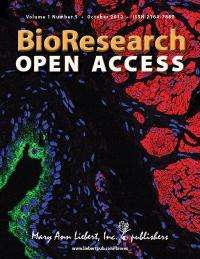Is the detection of early markers of Epstein Barr virus of diagnostic value?

Epstein-Barr virus (EBV) is the cause of infectious mononucleosis and a risk for serious disease in liver transplant recipients. Molecular tests that can identify early protein markers produced by EBV may have value for diagnosing active infection. The benefits of this diagnostic approach in patients with mononucleosis and in EBV-infected transplant patients are evaluated in an article published in BioResearch Open Access.
Andrea Crowley, Jeff Connell, Kirsten Schaffer, William Halla, and Jaythoon Hassan, University College Dublin and St. Vincent's University Hospital, Dublin, Ireland, compared three immunoassay methods for detecting antibodies produced by the body in response to EBV infection and the presence of proteins that comprise the EBV early antigen complex. The researchers determined which of the diagnostic tests could better predict EBV infection in patients with mononucleosis or in immunosuppressed adult liver transplant recipients. The article "Is There Diagnostic Value in Detection of Immunoglobulin G Antibodies to the Epstein–Barr Virus Early Antigen?" presents the complete methodology and results of this study.
"Having the ability to predict the risk of developing EBV-induced lymphoproliferative disorders after a transplant has important consequences for patient care, as it would allow for prompt therapy and could potentially decrease patient mortality," says Editor-in-Chief Jane Taylor, PhD, MRC Centre for Regenerative Medicine, University of Edinburgh, Scotland.
More information: The article is available free on the BioResearch Open Access website.















